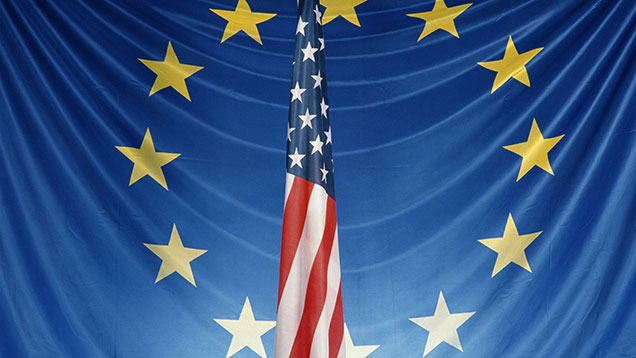How US free-trade negotiations threaten UK poultry
 © REX/PhotoAlto
© REX/PhotoAlto MP and supporter of the poultry industry Roger Williams recently tabled a debate in parliament to highlight the threat that the Transatlantic Trade and Investment Partnership (TTIP) may pose to UK poultry.
See also: Farming divisions threaten US-EU trade deal
Poultry and its contribution to the economy
Mr Williams opened the debate by giving an overview of the contribution poultrymeat makes to the UK economy each year.
- Britain produces 900 million chickens in 2013, up from 780 million in 2001
- Based on sales of £6.1bn, the poultry industry made a £3.3bn gross value added contribution to UK GDP
- The industry supports 73,000 jobs in the UK and pays about £1bn in tax to the exchequer
- Virtually half the meat produced in the UK is chicken, and we are about 80% self-sufficient, making poultry an important contributor to food security.
So why is TTIP a threat?
TTIP would result in the removal of import tariffs that protect EU producers from cheaper American food products. It would create a free trade area with the USA.
Mr Williams said during the Commons debate that, “the standards in areas such as sustainability, food hygiene and antibiotic use differ greatly between the UK and the US”.
He went on to highlight “meticulous” measures that the UK industry undertakes in biosecurity, transport and processing, as well as the far tighter controls on antibiotic use in place here.
Proponents of European poultry say its hygiene is higher, and that in the USA producers must rely on carcass washing to make birds safe to eat – a practice banned in the EU.
A key principle of TTIP is the so-called “equivalence” of products that can be traded. Mr Williams asserted that, for these reasons and more, poultry reared in the UK was not equivalent to that in the USA.
What about eggs?
It is a similar story. Educated estimates put the added cost of enhanced welfare, required by EU law, at 15% of cost of production. To give one example, hens in EU enriched colony cages must have 750sq cm each, whereas in the USA it’s between 350-400 sq cm.
Egg bodies have argued that it is unfair to allow imports of a product that is produced in lower-welfare systems, without the legislation that adds cost to domestic producers. The British Egg Industry Council says it costs, on average, 25% less to produce a caged egg in the USA than in the EU, and the differential between their cage and our free range is even greater.
What can be done?
In his debate, Roger Williams said there were three areas in which the government could “play a crucial role” to ensure a workable outcome for the UK poultry industry:
- By sending a clear message to the European Commission that the UK does not consider US poultry as equivalent produce
- That if the USA wishes to export to the EU it will modify its production standards to bring them in line with those in Europe
- To reinforce that trade deals are a two-way street. “This is not just about the export of chicken from the US to the EU; it must also be about the real opportunities for UK poultry producers to export in significant volumes to the US”.
The response from government
Farm minister George Eustice replied to the concerns on behalf of government. It came to about 2,000 words according to Hansard, but to summarise:
Opening export markets was highlighted as a priority for the UK’s food and farming sector – not just in the USA, but China, Madagascar and Mozambique.
- The “opening offers” in negotiating TTIP were rejected by both parties. He conceded there was a feeling the EU had offered too much, the USA too little.
- Mr Eustice said he “appreciated the concerns” about food safety and animal welfare, and whether they could place UK producers at a disadvantage
- But he highlighted that the proposal is “just the beginning” of the process, and that detailed negotiations would relate to specific market access issues
- He also hinted that health certificates could prove a route to equivalence, saying “those certificates sometimes include a recognition of animal welfare considerations”.
The verdict
This debate represents one of the highest-profile hearings of the concerns that poultry industry bodies have been airing for a number of years.
It comes down to a straightforward conundrum: legislative restrictions place extra cost on primary food producers, but those negotiating TTIP want to gain access to as many export markets as possible.
The challenge, as is often the case, will be in pleasing both parties.
